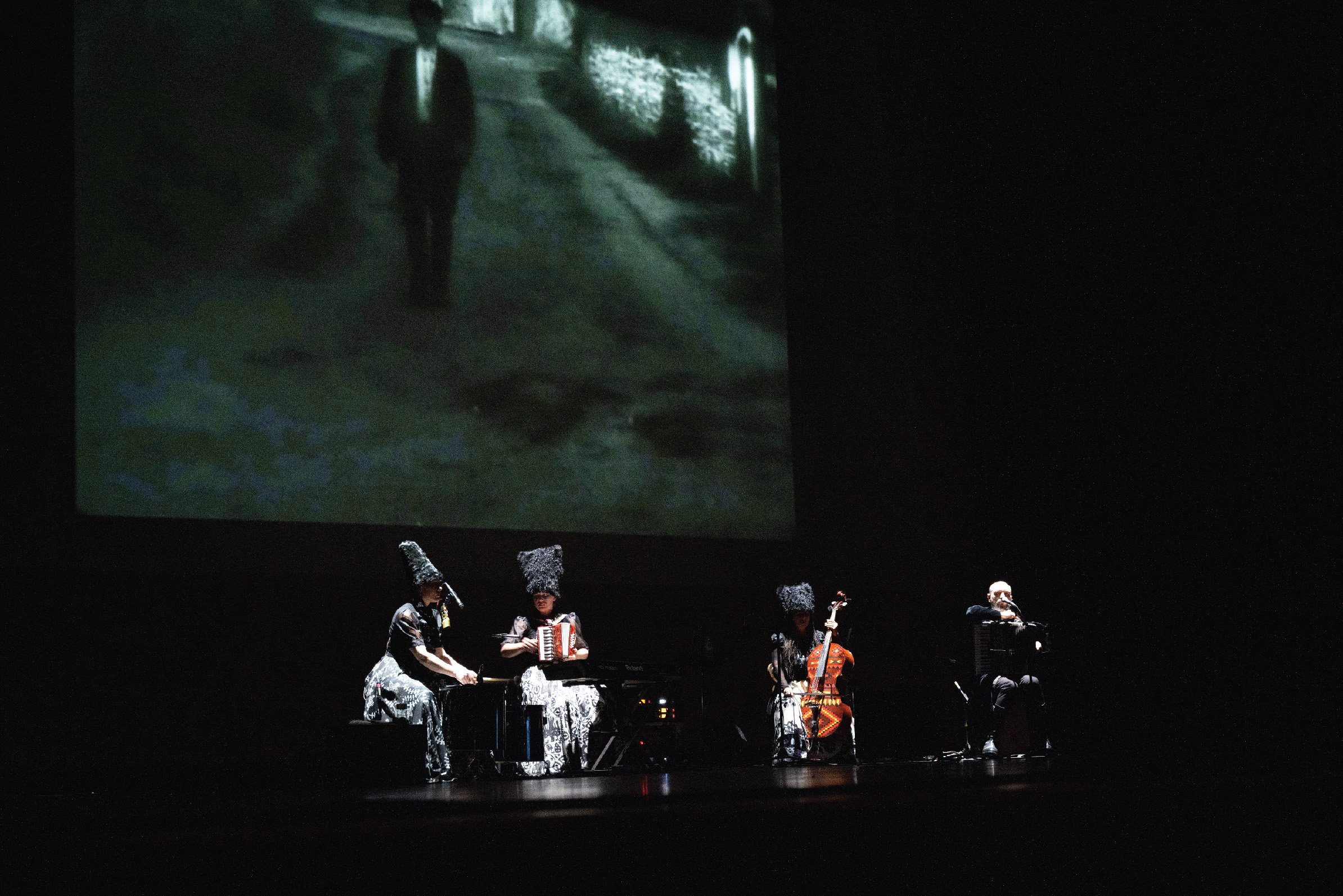dakhabrakha
A boy unfurls a Ukrainian flag from the back of a sedan as the sun sets in unnameable colors over the ridge. Children are playing under the sculpture Murmurations, metal poles wrapped in blue gauze, while others start to follow the chalked Arabic script of an installation by Muhammad Zaman from the parking lot to the courtyard beside the theatre, buzzing in the dusk with patrons buying beers and posing for portraits in front of murals scattered throughout the terraces of Brutalist concrete.
Tonight the Ukrainian quartet DakhaBrakha will perform their original live accompaniment to Alexander Dovzhenko’s Earth, a silent film the Soviets commissioned in 1930 and banned only nine days after its release, now hailed as one of the greatest works in cinematic history.
in print discover issue twenty four
The avant-garde director and auteur Vladyslav Troitskyi, founder and “ideologist” of the group, has called its music “ethno-chaos.” The music, like the costumes–white lace wedding dresses or militaristic black wool overcoats, pointed boots, piles upon piles of beaded necklaces, accessorized fish, and most recognizably, their soaring, irregular wool hats–combines a variety of distinct Ukrainian ethnic folk traditions, all of which the members spent years researching across the country’s far-flung villages and farmlands. To these, they add a healthy dash of Middle Eastern influence, stark and literal imitations of birdsong and heavy weather, and an ambient awareness of American R&B. In 2008, four years after the band’s founding, Vladimir Putin in a private meeting with then-President George W. Bush insisted that “Ukraine is not a country.” Later this summer, he will expand upon the lie: modern Ukraine is a “fiction,” he will tell a Moscow audience, merely one of Lenin’s “sloppy” mistakes. For nearly two decades, DakhaBrakha has been a loud, living counterargument. Tonight, they make this counterargument in Western New York.
There are 532 people listening–some Western New Yorkers with Ukrainian ties, some appreciators of foreign films and followers of the University at Buffalo’s Bruce Jackson, who will interview the band after the performance, and some diehard fans of DakhaBrakha since even before their arresting NPR Tiny Desk concert in 2015.
The Artpark Mainstage Theatre sometimes feels empty. The most the facility can do to right-size for a smaller crowd is close the back gates that offer a view to an additional 2,000 lawn seats. Designed without a mezzanine, the auditorium and towering fly house give the impression of an aircraft hangar. The building would have swallowed a crowd this small at a typical concert, but when the lights go out and the first human hum issues from the amplifiers, space flattens against the proscenium–there is only the screen and the four seated performers lightly backlit below it. We see a patriarch slowly dying under an apple tree, then a tight, close shot of the thousand-seeded head of a sunflower. Nina Garenetska, Olena Tsibulska, Iryna Kovalenko, and Marko Halanevych weave their rich accompaniment, layering shouts, wails, and whistles over surging strings, buzzing lamellophone, unrelenting percussion. In their voices, cast through and against the film, there is a sense of a common primal substance from which all narrow and nameable emotions come. Brother-love, father-scorn, hunger-hate, wonder-gratitude. We experience these states, but also something older, immeasurable, unmade.


